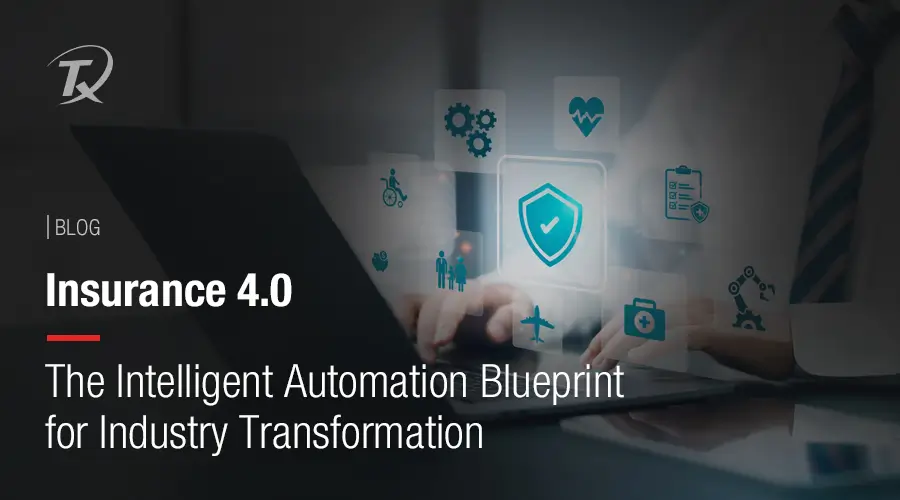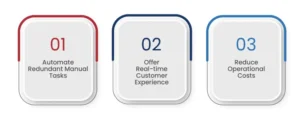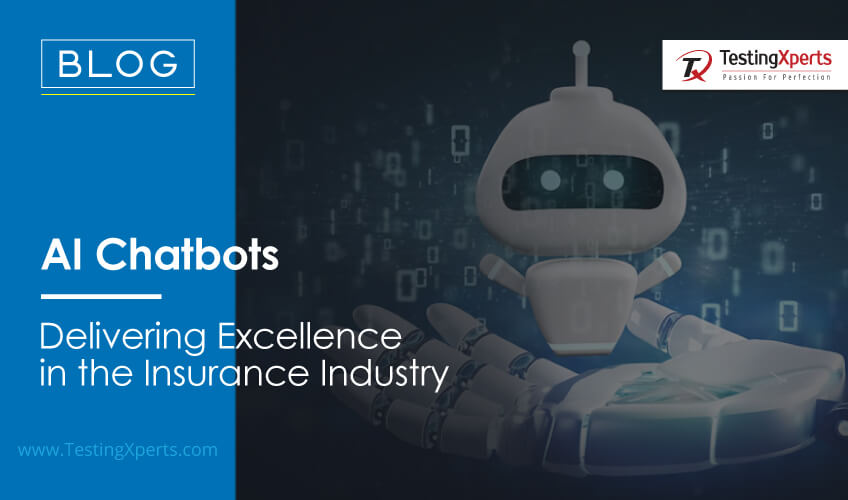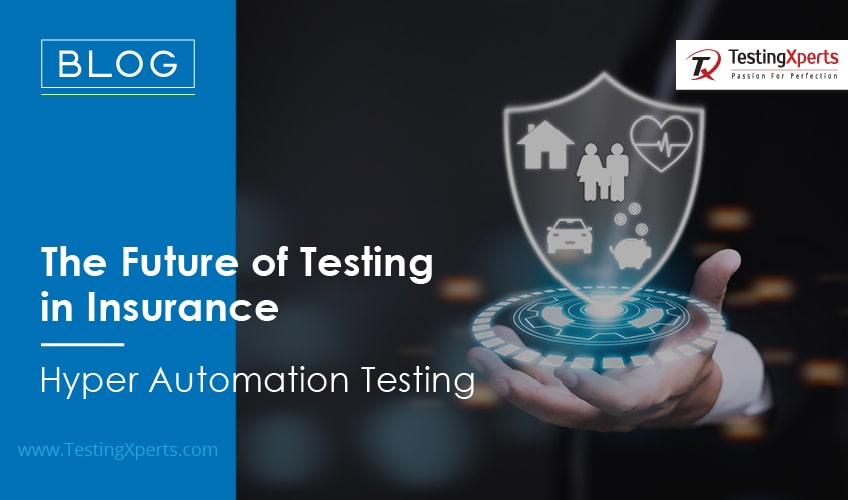
- Role of Intelligent Automation in Insurance 4.0
- Why Transit to Insurance 4.0?
- Key Drivers of Insurance 4.0 Revolution
- Business Benefits of Intelligent Automation in Insurance 4.0
- How can Tx help with the Insurance 4.0 Transition?
- Summary
Have you heard about Industry 4.0? Have you heard about Insurance 4.0? Industry 4.0, or the fourth industrial revolution, involves using intelligent automation solutions to improve industrial processes. Multiple technologies, such as AI/ML, cloud computing, big data, cyber-physical systems, robotics, and more, facilitate this approach. While insurance businesses are adopting digital transformation, disruptive tech players are integrating innovative technologies from this industrial revolution to optimize the entire ecosystem, giving rise to Insurance 4.0.
Automation is one of the key factors facilitating insurance transformation. The focus is on increasing efficiency and improving output quality while minimizing costs. Now, the question is, how is intelligent automation reshaping the insurance industry’s transformation?
Role of Intelligent Automation (IA) in Insurance 4.0

According to a source, leveraging intelligent automation could save 40-70% of the cost. The key is understanding the different aspects of automation and developing a strategy curated to business requirements. Insurers optimize operational efficiency, improve CX, and reduce operational costs by leveraging AI, ML, RPA, NLP, and other intelligent automation solutions. To understand the role of IA in supporting Insurance 4.0, let’s take a look at some of the real-world use cases:
- Lemonade, A prominent digital insurer, is leveraging intelligent automation to streamline claim processing. The AI-powered algorithms working at the backend in their mobile app quickly analyze the incoming claims data, validate information, and assess damages. The whole process is automated, allowing Lemonade to settle claims as soon as possible, which is efficient for policyholders.
- Geico, one of the leading US auto insurance companies, leverages IA to offer personalized services. Their AI-powered virtual assistant, Kate, engages with users to provide policy details, address queries, and help them navigate new updates. This level of personalization helps improve customer satisfaction.
- One of the globally renowned insurance companies, AIG, utilizes intelligent automation solutions for insurance underwriting. AIG improves its data analysis capabilities by using AI algorithms for risk assessment and determining the correct policy premiums. This also allows them to offer competitive pricing while maintaining higher-risk coverage.
- Allstate, a leading insurance provider, uses IA to prevent insurance fraud. Its sophisticated system uses data analytics and ML to spot dubious patterns in insurance claims and flag fraudulent activities. By effectively detecting and addressing fraud while creating a fair base for genuine policyholders, Allstate saves millions of dollars annually.
Why Transit to Insurance 4.0?

AI has been one of the core aspects of the Insurance 4.0 revolution. It allows insurers to optimize their core processes, improve productivity, and upscale service quality. Then there’s IoT, which unlocks a wealth of new data points, allowing insurers to understand their user base thoroughly. On top of that, GenAI is transforming data-driven decision-making and improving customer engagement in areas such as insurance claims processing and underwriting.
Many new tech innovations are assisting insurers in automating mundane tasks and improving the quality of their data. From this perspective of intelligent automation solutions, the best approach is to transition to Insurance 4.0 seamlessly.
Key Drivers of Insurance 4.0 Revolution

For modern-day insurance organizations, the list of challenges is never-ending. From customer demand shift to regulatory compliance issues, it’s an endless cycle of tech innovation. It is now a top priority for insurers to transform and remain efficient and competitive digitally. And that’s what Insurance 4.0 is about. Businesses must transform their legacy systems and processes to adapt to market changes and utilize the full potential of new tech innovations. Let’s quickly look at some of the key drivers steering the Insurance 4.0 revolution:
Automate Redundant Manual Tasks
To work with talented professionals (claims handlers, underwriters, domain knowledge workers, and customer support personnel), insurance organizations are realizing the need to make the work smoother and more manageable. Manual processes make people frustrated, and productivity suffers as a result. Businesses can digitize repetitive and low-value tasks by offering cutting-edge intelligent automation tools. This will allow team members to focus on high-value tasks.
Offer Real-time Customer Experience
Consumers desire an easier way to transact. No one likes to spend time on hold when calling insurance customer support or in the queue when accessing the online portal. Insurers are working towards making the customer experience seamless, easier, and faster to gain a competitive advantage in their domain. Falling behind the CX curve in the digital age means losing potential customers to competitors.
Reduce Operational Costs
Nowadays, agile startups are coming to the market with faster and cheaper solutions than traditional service providers. The cloud is not the end; it’s their starting line. So, to remain competitive, insurers must implement measures that can help them reduce costs while modernizing their operations and call centers. They make claims processing more efficient, accurate, and faster while allowing underwriters to draft personalized insurance plans.
Business Benefits of Intelligent Automation in Insurance 4.0

The primary reason why insurers should leverage intelligent automation solutions is to reduce costs, optimize efficiency, and improve output accuracy. Let’s look at some business benefits of intelligent automation in Insurance 4.0:
- Speed up claims handling by reducing manual paperwork and streamlining workflows, resulting in quicker settlements, improved customer satisfaction, and lower operational costs.
- Analyze data in real-time to detect fraudulent claims early to reduce financial losses and enhance trust among policyholders.
- Tailored policy recommendations based on individual customer profiles, improving engagement and retention while ensuring better service.
- Improved risk assessment by analyzing past data and patterns, leading to more accurate underwriting decisions and better policy pricing.
- Stay compliant with evolving regulations by ensuring accurate reporting, documentation, and adherence to industry standards.
- Ensure smoother operations, reduce the turnaround time, and minimize customer frustration from policy issuance to renewals and cancellations.
- Automation enables insurance companies to scale operations effortlessly, handling increased workloads without proportionally increasing costs.
- Streamline daily operations and automate repetitive tasks to cut down on admin costs, reduce human errors, and allocate resources more effectively.
Why Partner with Tx for Insurance 4.0 Transition?

Organizations must become more responsive and nimbler to change to remain competitive in the ever-evolving insurance ecosystem. Tx has extensive experience in the insurance industry and offers next-gen digital assurance (DA), QE, and software testing services for this global client pool. By leveraging our in-house developed RPA-based automation frameworks and AI accelerators (Tx-SmarTest and Tx-Automate), we help our clients deliver robust and scalable insurance products. Our expertise in intelligent automation solutions has enabled our clients to achieve the following:
- 40% QA cost savings
- 30% faster time-to-market
- 90% man-hours saving
- 40% higher operational efficiency
Summary
The insurance industry is undergoing a digital transformation with Insurance 4.0, driven by intelligent automation. By leveraging AI, ML, RPA, and advanced analytics, insurers can enhance efficiency, reduce costs, and improve customer experiences. The benefits range from faster claims handling to improved risk assessment and optimized operational efficiency. As insurers navigate this shift, adopting intelligent automation will ensure scalability, accuracy, and compliance, positioning them for long-term success in a competitive market. Contact our experts now to know how Tx can transform your insurance processes.
Discover more
Get in Touch
Stay Updated
Subscribe for more info




